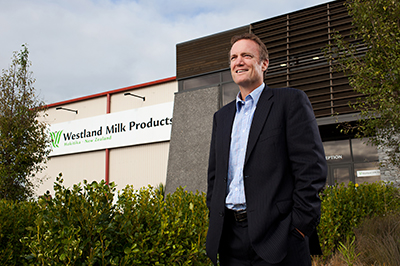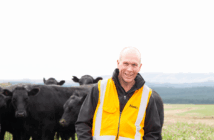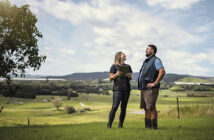The call of home proved too strong for a high-flying Kiwi who now heads the country’s second-biggest dairy cooperative.
Not even a plum job as Fonterra’s global account manager for Nestle could keep Rod Quin overseas any longer. “The decision to come back to New Zealand in 2009 after being away for seven years working in Germany, Japan and Switzerland was made with one eye on my career and the other on the family,” he admits. “The kids were getting older and I was getting back to New Zealand within an industry about which I am extremely passionate.”
An offer to head Westland Milk Products proved irresistible to Mr Quin, who holds a Bachelor of BioTechnology degree with honours from Massey University and a post-graduate Diploma in Operations Management from Auckland University.
“I respected what I’d heard about Westland and appreciated that they had some challenges as a smaller business compared to Fonterra but customers held them in high regard – not only the quality of their product but also their people,” he recalls.
Among Westland’s many challenges following industry deregulation was the lack of external customer sales, having only worked alongside the Dairy Board. “Whilst they had some customer relationships via those relationships they didn’t have direct customer sales experience and that was something they had to learn very, very quickly,” Mr Quin explains.
Forming relationships with some key customers and many distributors paved the way for the company to get to know the global market. “When I arrived they still had a lot of business with distributors and traders – we reversed that and today most of the business is directly with customers,” he notes. “We use traders or distributors where we see they add value, where they take risk out of our transactions or provide an extra service.”
The new CEO’s steady stewardship has seen Westland increase turnover 50 per cent to $540 million and invest more than $60 million in new plant and facilities, cementing the 75-year-old company’s place as a globally significant dairy cooperative.
The milk supplied by the cooperative’s 350 dairy farmer owners now produces a wide range of dairy ingredients and finished products including butter, milk powders, caseinates, milk protein products and yoghurt premix.
These products are sold in at least 40 international markets, with more than 70 per cent of sales coming from an Asia-Pacific region that is growing rapidly – and equally importantly is willing to pay premium prices. “This season we’re on track to do about $800 million off 68 million kilos of milk solids that produce around 127,000 tons of finished product,” Mr Quin adds.
Much of this growth is based on high demand items such as infant toddler nutrition, although there are plans afoot to widen the portfolio. “The largest demographic in future will be the seniors market, so we want to offer nutritional solutions to a sector which is growing in size, consumes reasonable quantities and does so for many years as opposed to an infant demographic that consumes for six months to 3 years.”
New markets are another key to growth, with China playing a “very important” role. “Five years ago China contributed about five per cent of revenue but this year it will be about 20 per cent or $150 million – more importantly they are becoming the biggest consumers of higher value nutritional products,” Mr Quin reveals. “We’ll see that evolve in the years ahead to be 25-30 per cent of total revenue and an even bigger percentage of higher value sales.”
Westland has been exporting to China for some 10 years, largely to the Shanghai hinterland, but inland cities such as Changsha are “real growth” areas. “We’ve got to be reasonably selective about who we deal with in China as some of the customers are very, very large so it’s about finding the right type of size match.”
Equally important to future progress is the 20-member Innovation Centre, which won the New Zealand Trade and Enterprise Best use of R&D award in 2012 for developing a special caseinate used in energy bars for the US market. “The caseinate imparted a lot of functionality, texture and flavouring and involved a lot of technical R&D and trials,” Mr Quin says.
This area of the business is so important a new General Manager Innovation role has been created, reporting direct to the CEO. “The direct report emphasises the importance and the fact that it should be someone who can look at all business areas and filter out innovation and value.”
Other essential elements in the development of a 500-employee company that is one of New Zealand’s top 50 companies by revenue and top 15 by export revenue include a new $102 million purpose-built spray drier known as D7.
A “game changer, it will include new batching equipment, high specification mixing equipment, additional warehousing, another laboratory and a 25kg packing line. “It could deliver another 20,000-25,000 tons of infant formula nutritional products,” Mr Quin notes.
“I’d like to see the company producing 35,000-45,000 tones of nutritional products over the next three to four seasons and D7 is therefore of critical importance as the 23,000 tons will add to the 17,000 tons we currently produce.”
He is also looking at other large scale investments including further milk processing investments in Rolleston and is contemplating acquisitions, especially finished packing formats and branded opportunities that would enable the company to get closer to consumers. “EasiYo yoghurt mix, for example, has been a really good acquisition that is obviously consumer focused and we are building on the EasiYo brand,” he says.
Similarly, the Westgold butter brand that’s sold into certain Asian supermarket chains and in Azerbaijan. “We’d like to build on those brands and are contemplating infant formula brands given the change in Chinese regulations, which insist that the brand owner also has control of its milk supply and therefore plays to the Westland situation.”
The future is changeable but the focus is clear. “We’d like to be a dairy nutrition company, building on the infant formula business and developing a range of infant and senior market consumer products to add to the portfolio,” Mr Quin says. “If we can do that we’ll provide superior and sustainable returns to our shareholders, on the basis of which they will be happy to invest more on their farms, we’ll get more of their milk and so the cycle will continue.”
By Geoff Picken





























































































